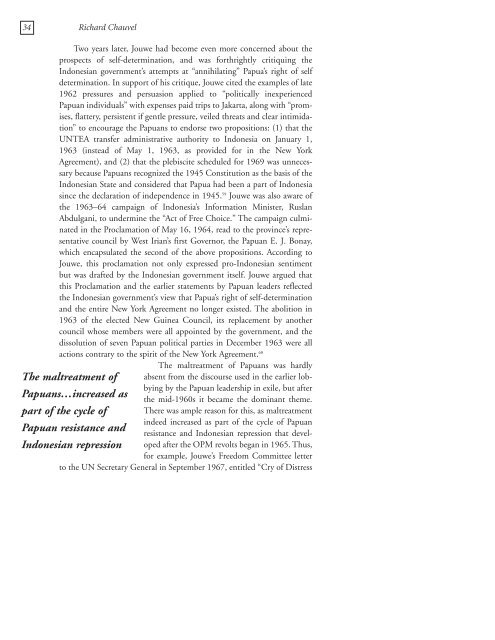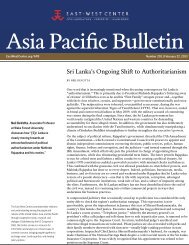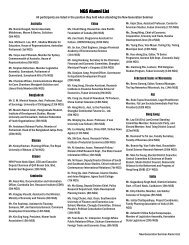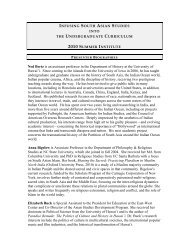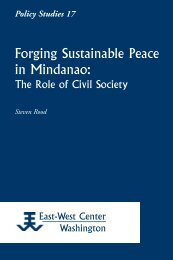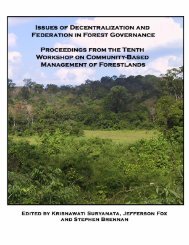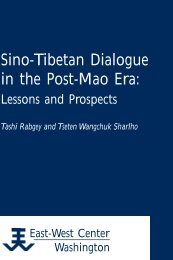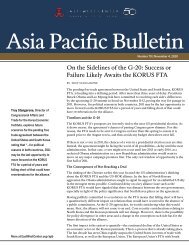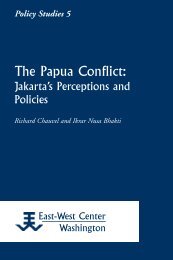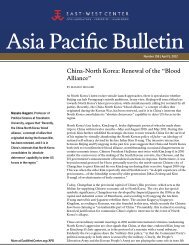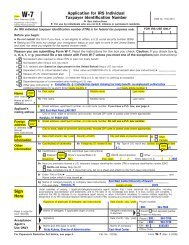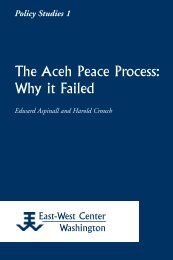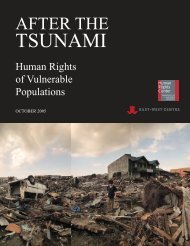Constructing Papuan Nationalism: History, Ethnicity ... - ScholarSpace
Constructing Papuan Nationalism: History, Ethnicity ... - ScholarSpace
Constructing Papuan Nationalism: History, Ethnicity ... - ScholarSpace
- No tags were found...
Create successful ePaper yourself
Turn your PDF publications into a flip-book with our unique Google optimized e-Paper software.
34 Richard ChauvelTwo years later, Jouwe had become even more concerned about theprospects of self-determination, and was forthrightly critiquing theIndonesian government’s attempts at “annihilating” Papua’s right of selfdetermination. In support of his critique, Jouwe cited the examples of late1962 pressures and persuasion applied to “politically inexperienced<strong>Papuan</strong> individuals” with expenses paid trips to Jakarta, along with “promises,flattery, persistent if gentle pressure, veiled threats and clear intimidation”to encourage the <strong>Papuan</strong>s to endorse two propositions: (1) that theUNTEA transfer administrative authority to Indonesia on January 1,1963 (instead of May 1, 1963, as provided for in the New YorkAgreement), and (2) that the plebiscite scheduled for 1969 was unnecessarybecause <strong>Papuan</strong>s recognized the 1945 Constitution as the basis of theIndonesian State and considered that Papua had been a part of Indonesiasince the declaration of independence in 1945. 59 Jouwe was also aware ofthe 1963–64 campaign of Indonesia’s Information Minister, RuslanAbdulgani, to undermine the “Act of Free Choice.” The campaign culminatedin the Proclamation of May 16, 1964, read to the province’s representativecouncil by West Irian’s first Governor, the <strong>Papuan</strong> E. J. Bonay,which encapsulated the second of the above propositions. According toJouwe, this proclamation not only expressed pro-Indonesian sentimentbut was drafted by the Indonesian government itself. Jouwe argued thatthis Proclamation and the earlier statements by <strong>Papuan</strong> leaders reflectedthe Indonesian government’s view that Papua’s right of self-determinationand the entire New York Agreement no longer existed. The abolition in1963 of the elected New Guinea Council, its replacement by anothercouncil whose members were all appointed by the government, and thedissolution of seven <strong>Papuan</strong> political parties in December 1963 were allactions contrary to the spirit of the New York Agreement. 60The maltreatment of <strong>Papuan</strong>s was hardlyabsent from the discourse used in the earlier lobbyingby the <strong>Papuan</strong> leadership in exile, but afterthe mid-1960s it became the dominant theme.There was ample reason for this, as maltreatmentindeed increased as part of the cycle of <strong>Papuan</strong>resistance and Indonesian repression that developedafter the OPM revolts began in 1965. Thus,for example, Jouwe’s Freedom Committee letterto the UN Secretary General in September 1967, entitled “Cry of DistressThe maltreatment of<strong>Papuan</strong>s…increased aspart of the cycle of<strong>Papuan</strong> resistance andIndonesian repression


